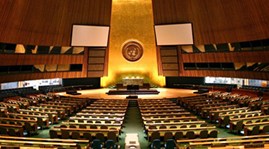However, observers say the treaty remains insufficient as it fails to ban sales of arms to terrorists and insurgent fighters.
The Arms Trade Treaty is considered an important means to control the global arms trade which includes tanks, armored vehicles, artillery, jet fighters, helicopters, warships, and missiles worth approximately US$80 billion a year.
The treaty sets standards for all cross-border transfers of
conventional weapons. Signatories must control their arms exports to ensure
that their use will not violate human rights or aid terrorism, organised crime
or war crimes. 
Additionally, governments must prevent weapons from being diverted to black markets. Arms control activists and human rights groups are hoping the treaty will help reduce illegal sales of arms which could be used for wars, atrocities or the abuse of power.
Although the treaty has just been approved, a number of comments have already been sent to the UN. Secretary General Ban Ki Moon said he expects that this treaty will be an effective tool against serious violations of human rights and international humanitarian law.
Washington welcomed the treaty and US Secretary of State John Kerry described it as strong and effective. British Foreign Secretary William Hague called it a major achievement for the United Nations.
Meanwhile, those who voted against the treaty or abstained from voting said that the Treaty has had a lot of flaws and loopholes. Iran, Syria and the Democratic People’s Republic of Korea voted against the measure.
Iran’s representative to the UN said one of those flaws was its failure to ban sales of weapons to groups that commit "acts of aggression," ostensibly referring to rebel and terrorist groups. He said Iran did not agree with the Treaty because the right to self-defense, fighting against invasion and maintaining national territorial integrity are not respected.
Syrian Ambassador Bashar Ja'afari echoed Iran’s concerns, saying he also objected to the fact that the treaty does not prohibit weapons transfers to rebel groups.
Pyongyang said the treaty could easily be abused by major weapons exporters.
Russia, along with 22 other countries, abstained from voting due to concerns that the treaty falls short of banning weapons for non-state organizations. A Russian representative to the UN said that humanitarian criteria in the treaty could be abused for political purposes.
In addition to loopholes that permit weapons to be transferred to terrorists, the realization of the treaty is uncertain. Even those who voted for this historic document admit that signing the treaty is just the first step, which will be followed by a major campaign to implement it.
Mexican Deputy Minister for Multilateral Relations Juan Manuel Gomez Robledo said that the difficult work has just begun. In the US, the world’s largest arms producer, the National Rifle Association said they will try to block the treaty’s passage through the US legislature. This organization said that the treaty would violate the US Constitution and undermine US national security.
ATT is the most important arms treaty since the 1996 Comprehensive Nuclear Test Ban Treaty. The new treaty enjoins governments to control their weapons exports through specific regulation. It will be signed on June 3 and will take effect once 50 of 193 UN members ratify it.
VOV5/VOV online


























